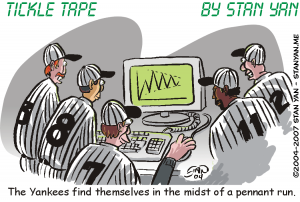Overconfidence is ubiquitous among traders. There are several explanations for overconfidence, depending on the psychological theory one uses to understand it. We’ve looked at overconfidence from the psychoanalytic and behavioural perspectives. Today, we look at the cognitive information processing perspective.
Humans process information in a way that is similar to how computers analyze, retain, store, and retrieve information. But people sometimes have limitations when it comes to information processing capacity. They can’t process all possible available information, so they rely on “heuristics” or “rules of thumb,” which process information quickly and efficiently, but are often wrong. Overconfidence occurs when traders don’t have enough time or resources to process information adequately. They act on inadequate information and make mistakes. Sometimes, they act on some form of popular opinion.
Let’s consider a classic exercise that is used to demonstrate overconfidence in everyday decision-making. Answer the following questions: Are people more likely to die from asthma or tornadoes? Most people would say tornadoes and be very confident about their decision. It seems that we hear about fatalities from tornadoes all the time, but whoever dies from asthma?
We use the available knowledge to make our judgment. Actually, 1996 statistics show that out of 1 billion people, 920 people died of asthma compared to 41 who died in a tornado. Let’s try one more. Are people more likely to be killed in a homicide or kill themselves in suicide? The media always covers homicides, but what about suicide? Statistics show that 12,000 people died of suicide compared to 9,200 who died in a homicide. This exercise demonstrates how we rely on heuristics to make judgments. We try to use all available information, but our information is often based on unsupported beliefs, rather than on hard data. In other words, we believe we have more knowledge than we actually do; we use what we have, and are confident that we are right.
Many times, heuristics or rules of thumb work quite well, but sometimes they are faulty. It’s important to be aware that your knowledge, especially about the markets, may be limited. Groups of people may present you with information that a certain industry or sector is “hot” when, in fact, it’s merely everyone erroneously believing the same misinformation. Be aware of this natural tendency to over-extend knowledge and feel overconfident about decisions based on it. Question your knowledge. Get as much additional information as possible. Doing so will help you gain mastery over the tendency to act in an overconfident way.


